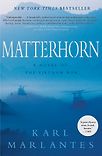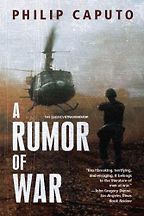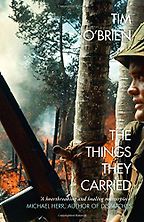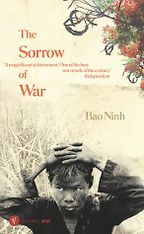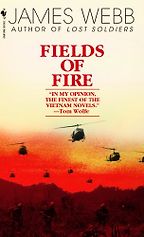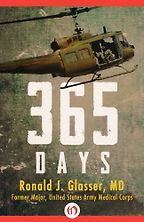You’re recommending books about the Vietnam War. Tell me about the first book on your list, A Rumor of War (1977).
Philip Caputo was a marine who later became a very well-known journalist. In my mind it’s one of the first really well-written books that describe the moral ambiguities and difficulties faced by a young marine officer in this particular war. Before that you had World War II when they took Iwo Jima and, OK, there was horrendous fighting, but it was much more clear-cut. Caputo was the first one to describe the terrible ambiguities. He got into trouble over something that happened, I can’t remember what, but he spoke very honestly about the difficult part of trying to be a man leading troops in combat in a difficult war.
Moral ambiguity sounds like a euphemism for something. Are you talking about atrocities?
No. I think it’s that there wasn’t the clear-cut good versus evil that you had in the Second World War. It wasn’t clear. We were involved in fighting the North Vietnamese, who weren’t nice! They committed terrible atrocities themselves. And we were involved in supporting a government, the South Vietnamese, and they weren’t nice and, obviously, getting thrown into the situation when it’s like – what really is going on here?
And, quite frankly for my generation, when we were little boys in the 50s we were raised on the knights in shining armour idea – we’re going to go and defeat evil Nazis. Vietnam didn’t have that. That’s what I meant by the ambiguity. There were no white knights on either side any more.
That must have been terribly distressing.
It was difficult, yes. But what happens — and I think it’s important to understand that when you commit to something like joining the military — these issues are important, but when you’re actually fighting you are no different from World War II soldiers. My own father was in Normandy and the Battle of the Bulge and my uncles fought in Italy and the Pacific and they all said that we didn’t think once about whupping fascism or anything of the sort. It was just: ‘How do we get out of this alive and help our friends get out of this alive and not let them down?’ It quickly boils down to those around you so there’s a point at which the issue of who’s the white knight disappears.
Your next book is a classic of Vietnam War books, The Things They Carried (1990) by Tim O’Brien.
I like this book because it was his second book about Vietnam. The first one, Going after Cacciato, was very surreal. It was about a patrol looking for Cacciato who was going to Paris, so they followed him to Paris. I don’t know O’Brien but my feeling was that it was an attempt by an author to try and have some artistic expression of what, at that time in our history, was looking pretty surreal. Apocalypse Now is not about Vietnam. It’s a surreal movie set in Vietnam but it could have been World War I. But when O’Brien wrote The Things They Carried he came down to absolute real brass tacks. It was no longer surreal, it was like here’s a list of what a grunt carries, an infantry soldier…
A grunt?
Right. Because infantry soldiers carry so much weight. That’s where the nickname came from because these people carry from 80-120 lbs on their backs. It’s the same now in Afghanistan and Iraq. There have been enormous technological changes but that infantry soldier on the ground, who actually is the sharp end of the stick, carries a lot of stuff — from pictures of girlfriends to ammunition. The Things They Carried is a series of short stories involving those things, things that bring you to reality.
It can be the most poignant thing about a soldier’s death – a little object that appears to sum them up.
I think because it snaps you between the two worlds. When you’re in the world of combat it’s a totally different psychic space. I don’t know what else to call it. The first time I lost somebody, one of my guys, I had to go through his pockets to get his personal effects, and in his left breast pocket was a picture of his high school girlfriend. He was just out of high school, of course. And the bullet had gone right through her face. And I just started to tremble… it was so… here’s a high school girl in his pocket with the bullet obliterating her face. It was just so bizarre. And then I had to get an artillery mission organised because they were landing too close to us and quickly you’re back into the… there’s no time to contemplate or mourn. It’s just like: ‘Oh God the shells are coming in…aaaaaargh.’ And you’re back into the other space. That’s why these poignant little bits are so…
The psychic space is interesting. Obviously Vietnam was a long time ago and you’ve written a novel, Matterhorn, now. What do you do with the space for 30 years?
Well, raise five kids? No, I worked on the book for 30 years. Not out of choice, but because nobody would publish it or even read it. So I kept saying: ‘Well, I can make it better.’ In some ways it was a two-edged sword. A typical way of dealing with war and trauma is to go to the bar or do drugs and shift jobs every six months. I would go into the basement and work on my novel and I think that was healthy. On the other hand, while I was working on the novel, I would get into certain scenes that were very close to things I had witnessed and it would trigger memories and the unconscious and my post-traumatic stress disorder — which goes by a thousand names but has been with us since The Odyssey. If you read The Odyssey, Ulysses has every symptom when he has that banquet. Fascinating. Homer obviously understood post-traumatic stress disorder. The other classic description of it is by Robert Graves in Goodbye to All That.
Next on your list of Vietnam War books is one written from the perspective of the Viet Cong. Tell me about The Sorrow of War (1987), by Bao Ninh.
This is a great piece of writing and the guy is obviously a talented writer. What struck me about it is the similarity of the feeling between people who just by the grace of God, by luck, were on different sides. He was born in North Vietnam, I was born in a logging town in Oregon. We end up in the same war on different sides and yet the experience of it is so similar for the individual soldier. He, of course, talks about the havoc wreaked on his country, which didn’t happen on our side. But I had a sense of the humanity of ‘the enemy’. We love to pseudospeciate our enemies – in a way you can’t get the job done if you don’t. But reading this piece of writing about an individual soldier in a war on the other side was just very moving for me.
We’re now at book number 4 of your Vietnam War books. This is Fields of Fire (1978) by James Webb.
This is a book I like because Webb understands the warrior mentality. I’m not one. I’m a citizen soldier who gets drafted and I’ll do my bit and then I want out. But there are warriors born into the world, and thank God we’ve got them – I’m no pacifist. And the hero of this book, it’s what he wanted to do since he was a child. He’s Scots-Irish and Webb is proud of his heritage and the Marine Corps is filled with these people, disproportionately from the Southern states which is where the Scots-Irish settled. So he explores that aspect of the human psyche – a guy who wants to be a warrior. Then, obviously, as a warrior, he runs into all the issues a warrior runs into and he’s a thinking warrior. Webb is someone who does think, in spite of the fact that he’s a politician (it’s hard for me to swallow that contradiction), and he’s a good writer. A lot of people like to think that we all hate war, and warriors hate war too, but there’s something in them that makes them good at it, that makes them think: ‘I can’t wait for the next one.’ That’s the way they are and you can’t lay a moral judgment.
Is it not addictive as well? Once you’ve been in that psychic space, as you put it, it’s very hard to get out again.
Well, I’ve read recent stuff about addiction to war, particularly correspondents, and someone actually wrote a review of my book calling it war pornography. I’ve never heard that before but I guess if that makes Tolstoy and Wilfred Owen pornographers then I’m in good company. I think addiction to war gets bandied around. I think you can get addicted to adrenaline and work that out in many ways. One of the ways you get addicted to adrenaline is to be in combat and I myself know a great many Marine friends in civilian life who do extremely dangerous snow- and ice-climbing, surfing, sky-diving. I don’t think any of them want to go back into combat. I’m sure, though, that there are people, a few, who learn to like it, but my guess is that they are damaged. Psychotic people like to kill people and we’re not talking about normal people any more.
No, I suppose not, but when you’ve experienced the very extremes of life — including the bonding with the people around you and the loss of them — then the mundanity of most people’s lives can be difficult to cope with.
Absolutely. I often think about kids I knew who were 19 – they were squad leaders, they were making life-and-death decisions and having unbelievable experiences. Then they come back and they get a job making hamburgers? It’s going to be crazy-making. It’s probably why we need so much more help moving combat veterans back into the civilian space again. We don’t do a good job with that. It’s not just PTSD, it’s also this existential lack of meaning. You’re a 19-year-old and you realise that if you don’t show up and get your job done then the machine gun you are supposed to be taking out will kill a lot of the other guys in the company, people you love. You are extraordinarily important and life has meaning, in the sense that your success and failure is life and death. You don’t show up for work at McDonald’s, who cares?
People you love. These extreme situations are so passionate that even the positive feelings are so much greater than you would get in ordinary life.
Totally. I try hard to give the reader a feel for that in my own book and that is one of the enduring positive aspects of war. When veterans get together, they’re not getting together to talk about their exploits or remember the war, which is the cliché, they are trying to experience that feeling that they did experience when they were younger and in that situation. To try to retouch that love, that comradeship.
The final book on your list of books about the Vietnam War is 365 Days.
This was a book I read before I went to Vietnam and it was written by an army doctor who wasn’t even there. I think he was in Japan. But what he did was he interviewed the people he was treating and it was one of the great examples of breaking through the statistics. An army doctor can say: ‘I treated 33 head wounds, did 14 amputations… boom, boom, boom, boom.’
“I wake up every day and I think about death, dying, things I did every day. It doesn’t go away.”
But if you talk to one of the 14 amputation cases and realise this is a real human being, with a real story about how he got there, it gives you this perspective. The next time you read the paper and it says, ‘We took light casualties’, you can take the next step and think: ‘I wonder who they were, I wonder what happened to them, I wonder if they kept their leg or they didn’t.’ So I was already in the reserve when I read this but it was like: ‘Oh my God, this is real stuff.’ It’s just an army doctor showing the human side of the word ‘casualties’.
Were you injured yourself?
Yes. I got two Purple Hearts. One was an easy one and one was a tough one – I ended up on a hospital ship, from a hand grenade.
So, tell me more about your book, Matterhorn.
Well, where do I start? It was a book I just had to keep working on because of this need to be understood. I always used to grate at words like ‘casualties’ and ‘the enemy’ and the ability of us to abstract away from those we’re talking about. You hear people talking about Marines and the image is of these grizzled 35-year-olds, but the reality in Vietnam and mostly today too is that they are 19. They’re not grizzled, not close. They’re competent and well-trained but they’re kids and what they’re interested in is girlfriends and fast cars and drinking and that’s who they are. They have to grow up and assume enormous responsibilities at an age when, quite frankly, most people are not prepared for that. So how do they manage that? I wanted to write a novel that meant that, when someone who’s read it sees in a newspaper that the Marines have landed, they’ll go: ‘I know who that is. Not the ones in the movies. The ones in Matterhorn. That’s who’s doing the job.’ The book is about combat. It’s very focused. I don’t get into the politics of the war. I don’t talk about anything that these characters wouldn’t think or talk about – getting the job done, racism, class issues, unfairness. People have said about my book: ‘He doesn’t talk about the suffering of the Vietnamese.’ But my characters wouldn’t have thought of it. They just didn’t.
Have you found it cathartic or are you mourning the loss of it now the book is out?
That’s a funny question. I was telling someone the other night: ‘I lived with this book for 35 years.’ It’s like living with your wife for that long and you agree that it’s time, it’s over, but then you see her with another guy it’s like – waaaaaah!
But do you feel as if you’re supposed to have finished thinking about Vietnam?
No. I’m happy it’s done. I’m done with that. What I remember from Vietnam has little to do with the novel. I wake up every day and I think about death, dying, things I did every day. It doesn’t go away. You don’t talk about it. It flits through your mind while you’re doing your daily work. Luckily for me I’ve had lots of help with PTSD and I’ve got medicine and it just sort of comes in one side and goes out the other side. There it was, there it went. But you go on with your life and it will be with me until the day I die.
Five Books aims to keep its book recommendations and interviews up to date. If you are the interviewee and would like to update your choice of books (or even just what you say about them) please email us at [email protected]
Five Books interviews are expensive to produce. If you've enjoyed this interview, please support us by donating a small amount.

